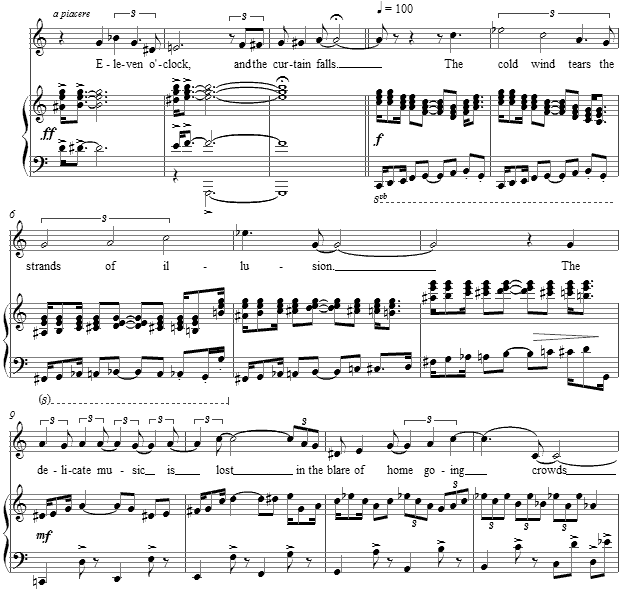Music and Texts of GARY BACHLUND
Vocal Music | Piano | Organ | Chamber Music | Orchestral | Articles and Commentary | Poems and Stories | Miscellany | FAQs
End of the Comedy - (2008)
Louis Untermeyer
for medium voice and piano
Eleven o’clock, and the curtain falls.
The cold wind tears the strands of illusion;
The delicate music is lost
In the blare of home-going crowds
And a midnight paper.
The night has grown martial;
It meets us with blows and disaster.
Even the stars have turned shrapnel,
Fixed in silent explosions.
And here at our door
The moonlight is laid
Like a drawn sword.First published in Poetry (May 1919)
[ 3 pages, circa 2' 00"]
Louis Untermeyer
Louis Untermeyer (1885-1977) was an American author, poet, anthologist, and editor who in 1939 was appointed Poet in Residence at the University of Michigan. He also held the same post at the University of Kansas City and Iowa State College, and in 1956 was awarded a Gold Medal by the Poetry Society of America. He served as Poet Laureate Consultant in Poetry to the Library of Congress from (1961-1963), but his early career was marred by his Marxist convictions and activities before and during WWI. In that time, the socialists were against United States involvement in "Europe's war." Among Untermeyer's early political writing were articles for periodicals such as The Masses, The Liberator published by the Worker's Party of America, and later The New Masses. Of more abiding consequence, Untermeyer co-founded The Seven Arts, a poetry magazine that introduced many poets of that time, including his long-time friend, Robert Frost. A prolific scholar, he wrote or edited almost one hundred books, most notably the Golden Treasury of Children's Literature, and exemplary anthologies such as Modern American Poetry" (1919), Modern British Poetry (1920), This Singing World (1923), Fifty Modern American and British Poets: 1920-1970 (1973) and his own work was featured in "Selected Poems and Parodies"
In the "Introductory" of Modern British Poetry (1920), Untermeyer wrote, "All art is a twofold revivifying -- a recreation of subject and a reanimating of form. And poetry becomes perennially “new” by returning to the old -- with a different consciousness, a greater awareness."
The "recreation of subject" for Untermeyer is taking the image of a late night in New York as the theater audiences leave to wend their way home, and paint this normal activity into a counterpoint between dark images of "shrapnel" and "explosions" albeit silent, and the hustle-bustle of New York, that "city that never sleeps at night." For this the unrhymed and unbalanced strophes of verse become a standard song lyric stretched out over popular syncopated gestures, as if the two voices, vocal and accompaniment stand in opposition. one speaking of the normal New York of 1910 and the other speaking of these noisy "illusions" becoming more horrific metaphors of violence, thereby making the title into a double entendre in which the comedy of the theater ends, but also the comedy of illusions ends, becoming a tragedy of darkly aggressive visions.

The score for End of the Comedy is available as a free PDF download, though any major commercial performance or recording of the work is prohibited without prior arrangement with the composer. Click on the graphic below for this piano-vocal score.
